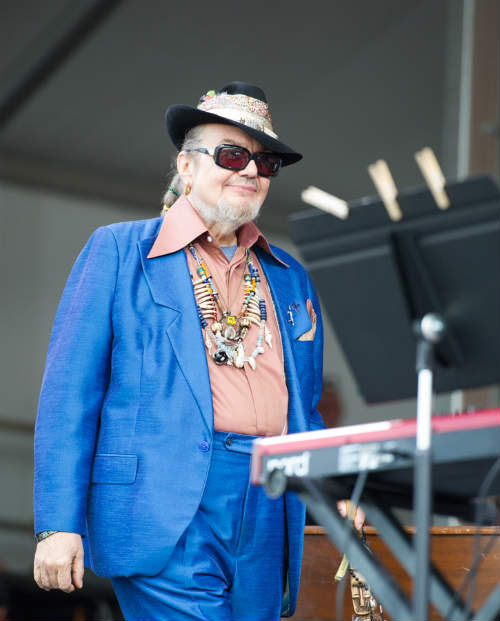Ah, the first morning of Jazz Fest: Five minutes into the inaugural set, and Flow Tribe are already demanding a singalong. The Fais Do Do stage is already the polar opposite of the racket at Gentilly, as the acoustic, two-thirds female Cajun trio T’Monde are seated in a semicircle, doing a haunting ballad in French. At Congo Square, Fredy Omar’s band is salsa-fying the theme from “Rocky”. And we wind up at the Acura stage, where the New Orleans Suspects play the first set as they did last year. This year’s set is different, though: For one thing, bassist Reggie Scanlan has recovered from his cancer surgery, so instead of being seated he’s jumping all over the stage. And though the band has played a few local chestnuts, this time their set was nearly all original. Seems this all-star lineup has jelled into a full-fledged band.
Paul Sanchez’s Rolling Road Show featured even more friends than usual—so many in fact that Sanchez himself only got to sing the first tune. Some of the names were familiar from Sanchez’s usual crew: Arsene DeLay soared on “It Could Have Been Worse,” the emotional centerpiece of the Nine Lives musical, and Alex McMurray brought the set to an anthemic close. But there was a new face in Chevis Brimmer, a young singer who displayed an easy charm and sang “Angel,” a fine R&B ballad that he wrote. It was the Fest debut for Brimmer, who’ll certainly be heard from again. And you’ve probably heard of his granddad: Fats Domino.
James Rivers is the kind of musician who plays everything under the sun, just because he can. And his Jazz Tent set with the Movement had to feature the day’s widest sweep of material: When we walked in he was on sax playing smooth-jazz versions of the MASH theme and “Ave Maria”. Then he switched instruments and did “Chim Chim Cheree” and the Rolling Stones’ “Miss You”…on bagpipes. Finally he uncorked a medley of Jimmy Reed blues tunes, which included a flute solo (yes, you heard right), on which he threw in enough grunts and gasps that I was pretty certain he was poking fun at Jethro Tull.
George Porter Jr’s Runnin’ Partners recently added a sax to their lineup, which meant they’re throwing a little jazz into their funk. And of all the Meters-related bands, they have to be the one going deepest into the catalogue (doing nuggets like “Do the Dirt” and “No More Okey Doke”) and taking the most chances with the arrangements.
Dr. John’s set marked the Fest debut of the Nite Trippers, the band he’s toured with this season after disbanding his longtime backup group, the Lower 911. The big surprise was that it wasn’t all that different. The set list was similar to the one I saw the prior band do last year: A stack of the new Locked Down songs upfront, then a few of his standards—the one deep cut was 1974’s “Mos’ Scocious,” with a guest sax solo from Herb Hardesty. True, the band doesn’t seem as naturally funky as the Lower 911 did (and the new guitarist should maybe be kept from playing with his teeth more than once per set), but time should remedy that. Trombonist and musical director Sarah Morrow was definitely in charge; during “Walk on Gilded Splinters” she played a wah-wah solo that suited the tune’s spooky feel. And the biggest change was that Dr. John played electric keyboards more than his usual piano, unearthing a ‘70s clavinet sound that worked fine on “Right Place, Wrong Time.” Still, it was odd not to hear “Goin’ Back to New Orleans,” which usually brings his Jazz Fest sets to a rousing close.
The standard rap on George Benson is that he’s a great jazz guitarist who sold out to slick R&B, but that’s not really fair. For one thing, he’s always seemed equally as home with the R&B, and he’s never dumped one kind of music for the other. At Congo Square he mixed both with no apologies, usually playing his hottest solos at the tail ends of the pop tunes. He started his discofied 1980 hit “Give Me the Night” without even having a guitar strapped on; so the song’s long, progressive instrumental coda was a pleasant surprise. Thanks to audience requests, Benson got two hits out of the way early: Someone called for “Breezin’” two songs into the set, and he responded “You really want to hear it now!?” But he obliged on both that and “This Masquerade,” which still left “On Broadway” to close out the set.
Click here for OffBeat’s Jazz Fest 2013 Photo Set from Day 1, April 26
Click here for OffBeat’s Jazz Fest 2013 online guide





